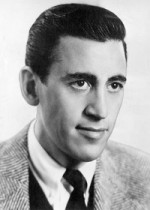 It’s been a strange and extraordinary week in the world of books, literature, and ideas. The great historian and civil-rights activist Howard Zinn died on Wednesday at the age of 87; so too did the author Louis Auchinchloss, who was 92. Yesterday, J.D. Salinger, a phantom for decades, passed away, and the coming years surely will bring rafts of rumor, speculation, promises of posthumous work, anecdotes true or invented, acquaintances and lovers unearthed, and the inevitable play for representation by the Wylie Agency. Far from great but certainly a large presence, the Borders megachain appears to be dying as well: its CEO has resigned to go head A&P and the bookseller is laying off a good chunk of its corporate staff.
It’s been a strange and extraordinary week in the world of books, literature, and ideas. The great historian and civil-rights activist Howard Zinn died on Wednesday at the age of 87; so too did the author Louis Auchinchloss, who was 92. Yesterday, J.D. Salinger, a phantom for decades, passed away, and the coming years surely will bring rafts of rumor, speculation, promises of posthumous work, anecdotes true or invented, acquaintances and lovers unearthed, and the inevitable play for representation by the Wylie Agency. Far from great but certainly a large presence, the Borders megachain appears to be dying as well: its CEO has resigned to go head A&P and the bookseller is laying off a good chunk of its corporate staff.
And there were false births and false deaths, endings or beginnings not quite what they were promised or expected to be. The Apple iPad appeared, and no one—shareholders, fanboys, or the beleaguered media—seems content with it, though it’ll probably sell in great numbers, and perhaps the media’s disappointment is a mirror of its own inadequate adjustment to technological change, charming mock-up videos notwithstanding. The Google Books settlement limps along, with Ursula Le Guin and the Richard Wright Estate now added to its long list of antagonists. Today is the deadline for objectors to make themselves known. Lawrence Lessig, as usual, is worth reading on this subject and his other thoughts about the future of culture and copyright.
This week also marked the observance of International Holocaust Remembrance Day, with educational events and memorials around the world. I attended a program at the Italian Cultural Institute of Los Angeles, co-produced by the USC Shoah Foundation Institute, which included a screening of the documentary Auschwitz: The Final Witness. We attendees were lucky to have Dario Gabbai, one of the documentary’s subjects, there, and he spoke movingly of his experiences as a Sonderkommando in Auschwitz. A vital 87 years old, Gabbai is one of less than five former Sonderkommandos believed to be alive, so his testimony is invaluable. The most startling and remarkable moment, though, may have been during the Q&A with Gabbai and Jonathan Petropoulos, a Claremont McKenna history professor, Holocaust scholar, and friend of Gabbai. A small, old man, sitting directly in front of me and quiet up to this point, raised his hand. In a shaky but resolute voice, inflected with the accent of old Central Europe, he said to Gabbai, “I was a prisoner at Birkenau B during that time, on October 7, 1944 [when the Sonderkommandos at Auschwitz staged an unsuccessful revolt and partially exploded one crematorium]. And I want to tell you that I have the deepest respect for you.” The room was silent, and Gabbai’s eyes looked vacant, glassy and remote, as if he didn’t even hear what the man said. Now passed a microphone, the man repeated himself again, pledging his reverence of Gabbai and the others like him who were victims of what one Shoah historian called “the choiceless choice” (be a Sonderkommando, assisting in the Nazi death machine; or die). But it was clear that Gabbai had him heard all along and was only lost in his own memories, which still produce nightmares.
“What could we do?” Gabbai asked. “Six hundred of us [out of 1,200 Sonderkommandos] died. But we had to try.”






